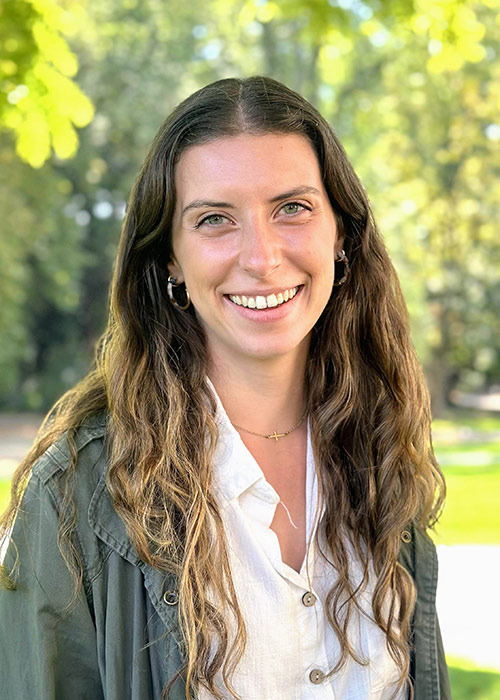
Why did you choose UW?
My undergraduate research mentor was previously a UW faculty member, and he exposed me to the network and opportunities to engage in global nutrition. Also, after living in the Midwest for seven years, I was ready to get back to the West Coast!
What influenced you to pursue a graduate degree in food systems, nutrition, and health?
As an undergraduate at Wheaton College, I took a course and learned more about the important role food insecurity plays in a person’s quality of life. I started asking why I have seemingly limitless access to abundant food, while those across the globe who farm the produce I’m eating, likely do not. I felt an urgency to study nutrition, a personal scientific fascination. I switched my major from international relations to interdisciplinary studies to create my own program focused on global nutrition. Once I started pursing nutrition as an undergrad, I got involved in a public health research project on breastfeeding in Kenya which continued to expand my interests.
Tell us more about your work in Kenya
Naivasha, Kenya is home to dozens of commercial flower farms that employ thousands of women to work in the greenhouses. The wages are low and this kind of employment poses major challenges to exclusive breastfeeding after women return to work. Our NIH-funded study examined the association between employment, work-place lactation supports and breastfeeding outcomes among mothers in Naivasha. We also qualitatively investigated barriers to exclusive breastfeeding and willingness to use lactation supports at work. I worked with the team to develop quantitative and qualitative research instruments through pilot testing in the field, conduct interviews, clean quantitative data, analyze qualitative data, draft manuscripts and keep everyone organized. This project exposed me to the entire project lifecycle throughout my five years which helped me realize my love of research.
How do you see the important role of nutrition in public health and disease prevention?
Nutrition is foundational to good health—one of the reasons I’m so passionate about it! In the program, we extensively discuss the correlations between nutrition and poor health outcomes, including chronic diseases, however, because food and security are also stratified by other social and economic conditions, sufficient individual nutrition intake is a justice issue. Therefore, improving public health nutrition can have impact in disease prevention and set people up for a higher quality of life.
What’s something you have learned while at UW that has changed your perspective?
Learning about the Satter Eating Competence Model and Division of Responsibility in Feeding has shifted my paradigm on how to implement nutrition interventions and provide nutrition counseling. I’m thankful to have been introduced to this perspective and hope to integrate it more into my future work in global nutrition programming.
Tell us about your fieldwork or a recent project.
Over the summer, I interned with PATH’s newborn nutrition team to complete my fieldwork. I had the opportunity to create a landscape of the global preterm nutrition guidelines and develop a human milk fortification product nutrition calculator to support an NIH grant on donor human milk composition. PATH is an incredible organization on the cutting edge of innovation for health equity and I learned a ton from smart, committed people.
What are your future goals?
My career aspiration is to become a leader in global nutrition programming and policy development. As a next step, I plan to gain skills in implementing nutrition interventions internationally either through research or work with a Non-Governmental Organization (NGO). After gaining experience in strategy and programming at the community, institutional or governmental level, I intend to get a PhD to open doors to leadership in research and/or policy initiatives.
I also want my personal life to positively contribute to creating a more just and nutritious food system through what I cultivate, purchase, prepare, and give away.
What do you like to do for fun?
I love spending time with friends! I like to be active through playing volleyball, hiking, biking and the occasional pickleball game. I also enjoy reading, cooking, travelling, and exploring.
What do you enjoy most about living in Seattle?
I enjoy the constantly changing beauty, evergreen trees, and proximity to the mountains.
What advice would you give someone considering your program(s)?
UW is a great option, especially if you are interested in a food systems approach. Seattle is amazing, too! There are tons of organizations doing incredible public health nutrition work in the city and lots of ways to get involved.
Are you interested in studying nutritional sciences as a graduate student? Explore programs and RDN training offered in the UW Food Systems, Nutrition, and Health program.